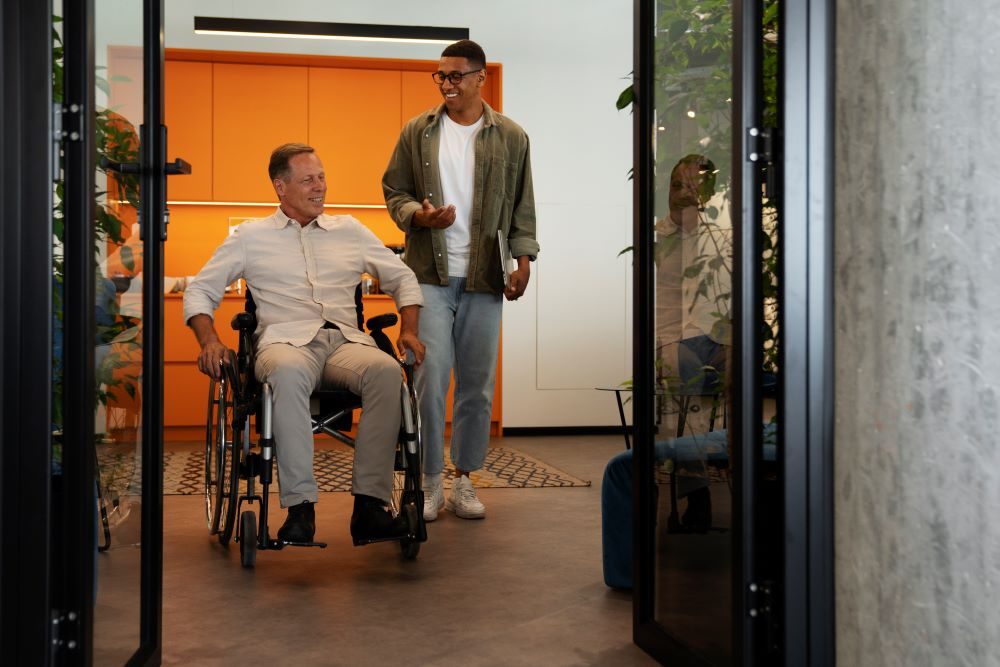July 26th is observed as National Disability Independence Day in the United States, commemorating the signing of the Americans with Disabilities Act (ADA) into law in 1990. This landmark legislation was a major step forward in promoting equal rights and opportunities for individuals with disabilities. Not only does it hold significance in the US but plays a significant role across nations.
On this day, it is essential to recognize the progress made in advancing inclusivity and accessibility in the workplace. In this blog, we will explore five top trends that support work for the disabled, empowering them to lead independent and fulfilling professional lives.
Inclusive Hiring Practices

Companies are increasingly embracing inclusive hiring practices, recognizing that a diverse workforce strengthens the organization. By focusing on an individual’s skills, qualifications, and potential rather than their disability, employers can tap into a broader talent pool. This trend includes promoting accessible job postings, offering reasonable accommodations during the application process, and fostering an inclusive work culture that supports all employees, regardless of their abilities.
Remote Work Opportunities
The COVID-19 pandemic accelerated the adoption of remote work, and this trend has been particularly beneficial for individuals with disabilities. Remote work provides greater flexibility, eliminates the need for physical commutes, and allows employees to work from environments they find most comfortable. As companies realize the benefits of remote work, they are more willing to accommodate employees with disabilities, providing them with a level playing field to contribute their skills and talents.
Assistive Technology Advancements

Assistive technologies have been transformative for individuals with disabilities, enabling them to perform tasks that were previously challenging or impossible. With continuous advancements in technology, there is a growing array of tools and devices that cater to various disabilities, such as screen readers for the visually impaired, speech-to-text software for those with motor disabilities, and adaptive keyboards for people with dexterity issues. Integrating these technologies into the workplace enhances productivity and empowers disabled employees.
Workplace Accessibility Initiatives
Many companies are taking proactive steps to ensure their physical spaces are accessible to all employees and visitors. This includes providing ramps, elevators, and accessible restrooms, as well as removing physical barriers that may hinder mobility. Accessibility initiatives extend beyond physical infrastructure to consider factors like signage, lighting, and acoustics to accommodate individuals with various disabilities, creating an inclusive environment for all.
Disability-Inclusive Diversity, Equity, and Inclusion (DEI) Programs

Diversity, Equity, and Inclusion (DEI) programs are becoming integral to the fabric of modern workplaces. Organizations are recognizing the importance of developing DEI initiatives that are inclusive of individuals with disabilities. This trend involves fostering a culture of understanding and empathy, implementing awareness and sensitivity training, and providing resources and support for disabled employees. By actively addressing the needs of disabled individuals, companies can create an environment where all employees feel valued and respected. You can also become a community service worker to support the disabled.
Conclusion
In conclusion, National Disability Independence Day serves as a reminder of the ongoing efforts to promote inclusivity and accessibility in society, especially within the workforce. These five top trends demonstrate the progress made in supporting work for the disabled, ensuring they have equal opportunities to thrive professionally. As we celebrate this day, let us continue to champion the rights of individuals with disabilities, making workplaces more inclusive, diverse, and empowering for everyone. By embracing these trends, we can pave the way for a more accessible and equitable future for all.
ABM College promotes an inclusive work environment.
Contact us to learn more about how we can help you find meaningful employment.
Read more industry related articles.
About The Author

Private Career College
ABM College is a leader in career-focused education, committed to empowering students with industry-relevant skills. With expert instructors and practical training, ABM College delivers high-quality programs in health, business, technology, and more, ensuring graduates are prepared to meet workforce demands. Known for its supportive learning environment and a focus on real-world application, ABM College is a trusted educational partner helping students achieve professional success across Canada.
